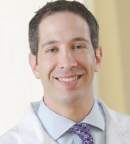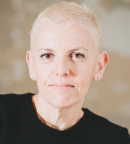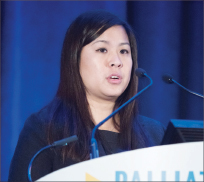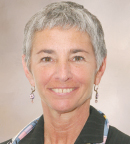Addressing the need to integrate palliative and supportive care practices into medical specialties to ensure optimal patient-centered care across the cancer continuum and the evidence-based remedies to accomplish that goal were the focus of the nearly 300 study abstracts presented at the 2017 Palliative and Supportive Care in Oncology Symposium held on October 27–28 in San Diego. As in past years, this year’s gathering attracted over 600 attendees in multidisciplinary specialties, including oncology, nursing, palliative care, social work, and psychiatry, as well as patients, patient advocates, and caregivers from a variety of countries, including the United States, Canada, United Kingdom, France, Italy, and China.
Cosponsored by ASCO, the American Academy of Hospice and Palliative Medicine (AAHPM), the American Society for Radiation Oncology (ASTRO), and the Multinational Association of Supportive Care in Cancer (MASCC), this year’s meeting included six general sessions, two oral abstract sessions, and two poster sessions as well as the inaugural presentation of the Walther Cancer Foundation Palliative and Supportive Care in Oncology Endowed Award and Lecture.
Anthony L. Back, MD, Professor of Medicine at the University of Washington Cambia Palliative Care Center of Excellence and the Fred Hutchinson Cancer Research Center, giving his presentation on Clinician Burnout: Why We Need a Multilevel, Multistakeholder Response, after receiving the Walther Cancer Foundation Palliative and Supportive Care in Oncology Endowed Award and Lecture. Photo ©ASCO/Phil McCarten 2017.
The award was presented to Anthony L. Back, MD, Professor of Medicine at the University of Washington Cambia Palliative Care Center of Excellence and the Fred Hutchinson Cancer Research Center and cofounder of VitalTalk, an interactive development course for clinicians and faculty to improve patient-clinician communication. During his presentation, Dr. Back spoke about clinician burnout and the need for a multilevel, multistakeholder response to the problem, which affects more than 45% of oncologists and 62% of palliative care specialists and is on the rise, according to Dr. Back.
“[Physician] burnout is a systemic problem, and we need to take action now,” said Dr. Back. “Clinicians can build resilience with training and practice … to make you less susceptible to the stressors you face every day.” Clinicians can augment their resilience skills, said Dr. Back, by managing their energy level during the day through improving sleep patterns, using attention mindfully, finding healthy boundaries, reframing cognitive distortions, calibrating expectations, regulating emotions, and discovering meaning in everyday life.
Prognostication in the Era of Immunotherapy
The general sessions at this year’s meeting focused on the integration of innovative models of oncology and palliative care; the unique supportive and palliative care challenges of treating older adults with cancer; symptom management to address issues such as insomnia, fatigue, and nausea; opioid risk assessment and management; sexual health; and palliative radiation therapy and palliative surgery. The symposium also included an important breakout session on palliative and supportive care in the immunotherapy era and featured a presentation by Eric Roeland, MD, FFHPM, Assistant Clinical Professor at the University of California, San Diego, on the difficulty of prognostication in the setting of immunotherapy.

Eric Roeland, MD, FFHPM

Andrew Epstein, MD
“Our ability to accurately prognosticate the course of a patient’s cancer trajectory is more challenging now that we have therapies that are sometimes producing better results than the results we were getting with the more conventional cytotoxic chemotherapies,” said Andrew Epstein, MD, Chair of the 2017 Palliative and Supportive Care in Oncology Symposium News Planning Team and Assistant Attending Physician at Memorial Sloan Kettering Cancer Center. “But we have to be mindful that, unfortunately, immunotherapy and other precision medicine therapies are not currently benefiting the majority of patients with cancer. And we have to be even more patient-centered in our delivery of care, as we become more hopeful about the molecular underpinnings that may be leveraged for some patients.”
He continued, “I liked Dr. [Eric] Roeland’s model using [the clinician’s] gut, brain, and heart as a necessary combination of human factors to best guide patients in prognostication about their cancer. We need to always keep his motto in mind: Hope for the best, prepare an emergency plan, and expect the unexpected.”
Financial Benefit of Early Palliative Care
The results from several study abstracts drew particular attention at this year’s symposium, including a study by Wendi G. Lebrett, BA, a medical student at the University of California, San Diego, and her colleagues, on the economic impact of early palliative care among elderly patients with advanced cancer.1 The findings from her study show that the economic impact of palliative care depended on the timing of the consultation. For example, a palliative care consultation within 7 days before death decreased health-care costs by $975. However, a palliative care consultation more than 4 weeks from death decreased costs by more than $5,000 (see page 67 for more on this study).
[Physician] burnout is a systemic problem, and we need to take action now.— Anthony L. Back, MD
Tweet this quote
“The findings from this study parallel the ‘value in cancer care’ equation, which ASCO has embraced as a very important factor in not only improving the benefits of care, but in decreasing health-care costs, as well,” said Dr. Epstein. “What was new from Wendi Lebrett’s presentation is that the economic impact was shown on a population level, which is important to realize, especially as we recently have seen different models of medical care emerging that are more value-based than volume-based.”
The oral abstract sessions showcased studies on the positive effects of early integrated palliative care on patients’ coping skills, quality of life, and depression2 as well as interventions to improve psychosocial outcomes in adolescents and young adults with cancer.3 These presentations provided evidence on how palliative care is effective in giving patients the emotional tools necessary to cope with a cancer diagnosis and in improving patient-centered outcomes.
New this year was a general session devoted exclusively to sexual health, intimacy, and palliative care, including what research is showing in sexual health and body image, interventions to facilitate sexual health, and how to overcome the difficulty of talking with patients about the potential sexual side effects of cancer and its treatment.

Anne Katz, PhD, RN, FAAN
“Sexuality … is still something considered taboo in oncology care and perhaps even more so in palliative care,” said Anne Katz, PhD, RN, FAAN, a certified sexuality counselor at CancerCare Manitoba, during her presentation, “Talking About Sexuality With Patients: Models, Myths, and Motivations.” She cited research showing that nearly half of patients with cancer never talk to their health-care provider about their sexual health concerns.4
Educating patients about all the potential side effects of cancer and its treatment, including sexual dysfunction, and their impact on patients’ quality of life is critical in providing high-quality oncology care. “I believe we have an absolute and fundamental responsibility to talk about the sexual consequences of treatment because we talk about all the other consequences, too,” said Dr. Katz.
Maintaining a Personal Touch
Also presented at the symposium was new research examining patient-physician communication and the preference of patients with advanced cancer to have their physicians speak with them face-to-face, with just a notepad in their hand to record their interaction rather than repeatedly turning to a computer to input information. The result of the randomized clinical trial shows that patients perceived physicians who communicated face-to-face without the use of a computer as being more compassionate, professional, and having better communication skills.5

Angelo E. Volandes, MD, MPH, Assistant Professor of Medicine at Massachusetts General Hospital, giving his keynote lecture on The Conversation: A Revolutionary Plan for End-of-Life Care. The misalignment between the type of care people want at the end of life and the care they actually receive is the most urgent problem in health care today, said Dr. Volandes. Photo ©ASCO/Phil McCarten 2017.

Wendi G. Lebrett, BA, presents the results from her study on the economic impact of early palliative care among elderly patients with advanced cancer (Abstract 91), at the Palliative and Supportive Care in Oncology Symposium on October 27, 2917. Photo ©ASCO/Phil McCarten 2017.
“This study is a reminder to all of us to minimize as much as possible the interruptions that often come with the use of technology when we are communicating directly with patients,” said Dr. Epstein.
The importance of personalizing care for patients through face-to-face interaction and the impact of technology on patient care was also the subject of the keynote lecture by Angelo E. Volandes, MD, MPH, Assistant Professor of Medicine at Massachusetts General Hospital, and author of The Conversation: A Revolutionary Plan for End-of-Life Care.6
Despite the fact that most people (90%) want to die at home, two-thirds of patients over age 65 die in the hospital, said Dr. Volandes. That misalignment between the type of care people want and the care they actually receive is what Dr. Volandes considers the most urgent problem in American health care today.
Dr. Epstein agreed. “Patient centeredness has always been important, but in this age of more sophisticated technology to diagnose and treat our patients, we have to become patient-centered in terms of really knowing who the patient sitting in front of us is and what is important to him or her as the disease takes its course, including at the end of life,” said Dr. Epstein. “As physicians, we have to do a better job of inquiring what our patients’ concerns are and assuring them that we will do our best to address those concerns.”
Providing Optimal Care for Patients
The overarching theme throughout the 2-day symposium was the promotion of the integration of palliative and supportive care practices for patients with cancer from diagnosis through survivorship and end of life utilizing both a multi- and interdisciplinary approach.

Jamie H. Von Roenn, MD, FASCO
“This year’s Palliative and Supportive Care in Oncology Symposium highlighted the need for collaboration among specialties for the provision of optimal oncology care,” said Jamie H. Von Roenn, MD, FASCO, ASCO’s Vice President of Education, Science, and Professional Development. “The presentations and discussions of the difficulty of prognostication in this era of precision medicine, prescribing opioids in the midst of an opioid crisis in the United States, and improving patient outcomes with integrated palliative and oncology care underscored this point.”
DISCLOSURE: Drs. Back, Epstein, Katz, Volandes, and Von Roenn, and Ms. Lebrett, reported no conflicts of interest.
REFERENCES
1. Lebrett WG, Roeland E, Bruggeman A, et al: Economic impact of palliative care among elderly cancer patients. 2017 Palliative and Supportive Care in Oncology Symposium. Abstract 91. Presented October 27, 2017.
2. Jacobs JM, Greer J, El-Jawahri A, et al: The positive effects of early integrated palliative care on patient coping strategies, quality of life, and depression. 2017 Palliative and Supportive Care in Oncology Symposium. Abstract 92. Presented October 28, 2017.
3. Rosenberg AR, Bradford M, Klein V, et al: The “Promoting Resilience in Stress Management” (PRISM) intervention for adolescents and young adults: A pilot randomized controlled trial. 2017 Palliative and Supportive Care in Oncology Symposium. Abstract 176. Presented October 28, 2017.
4. Flynn KE, Reese JB, Jeffery DD, et al: Patient experiences with communication about sex during and after treatment for cancer. Psychooncology 21:594-601, 2012.
5. Haider A, Tanco KC, Epner M, et al: Effects of examination room computer on cancer patients perception of physician’s compassion, communication skills, and professionalism: A randomized clinical trial. 2017 Palliative and Supportive Care in Oncology Symposium. Abstract 26. Presented October 27, 2017.
MORE ON PHYSICIAN BURNOUT
For more on physician burnout and how to protect against the problem, see an interview with Anthony L. Back, MD, on The ASCO Post Newsreels at www.ascopost.com/videos.
SAVE THE DATE
Next year’s Palliative and Supportive Care in -Oncology -Symposium will be held on -November 16–17, 2018,
in San Diego.

